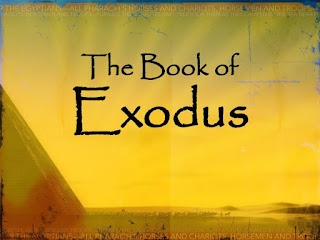What's in a name? Possibly, redemption.
"Names" is the literal translation of Sh'mot, the Hebrew name of the second book of the Bible (which readers in English call Exodus). That's because the book begins with the list of the names of all the Jews who went down to Egypt at the invitation of their family member, Joseph.
And then, for a good long while, no names appear in the text. The Jewish people are treated as a swarming mass. Even the Pharaoh who is afraid of their fertility and their numbers and therefore enslaves them is not called by his name, only by his title.
Namelessness and despair
Why have the Jews, who were individual members of the family of Jacob and his four wives when they entered Egypt at the end of the book of Genesis, become an anonymous horde?
Possibly, it's just because there are so many of them. We are told that it was in Egypt that the Jewish people became a nation.
Possibly, it's that they lost their identities. Instead of being proud of their ancestors and the God they worshiped, the enslaved Israelites may have tried to assimilate into the Egyptian culture. Some rabbinic commentaries claim they stopped circumcising their male children! (Others insist on the opposite reading.)
Possibly, the anonymity is related to anomie. After generations of being treated as nothing more than slave laborers, the Jewish people might have accepted that this is all they could be, that they had no power to resist, and that nothing would ever change.
Where does the change begin?
Change begins with the resistance mounted by the Hebrew midwives. The Pharaoh has commanded them to keep newborn Jewish girls alive (as slaves? as future brides?) but to kill all the newborn Jewish boys.But the midwives shrug their shoulders. "Those Hebrew women--they give birth before we can even arrive!"
Picture Pharoah's frustration. Picture the midwives' sly smiles.
And notice that the midwives, Shifra and Puah (may their memories be for a blessing!), are the first living people in the Book of Exodus who are identified by name. And they found the courage to resist.
Who else gets named in this Torah portion?
The next personal name we hear in Parshat Sh'mot is that of Moshe (to English readers, Moses). And all of a sudden, like he's wielding a Midas touch, everyone Moshe comes in contact with has a name.
His wife, Tziporah. His first son, Gershom. His father-in-law, Yitro (Jethro). His brother, Aharon (Aaron). Eventually, but not in this parshah, his sister Miriam, his parents Amram and Yocheved, many other Jewish tribal leaders and followers.
But most dramatically: in this parshah, God has a name. And it's a name that speaks of possibility.
14. And God said to Moses, "Ehyeh-Asher-Ehyeh." God continued, "Thus shall you say to the Israelites, 'Ehyeh sent me to you.'"
This new name means, "I will be what I will be." (Or even, "I will become what I will become.")
There are no limits to how God can appear in the lives of the enslaved Jewish people. So, there are no limits to their ability to be redeemed out of slavery, to become free, to resume becoming who they were supposed to become all along.
15. And God said further to Moses, "Thus shall you speak to the Israelites: The Lord, the God of your fathers, the God of Abraham, the God of Isaac, and the God of Jacob has sent me to you.
This shall be My name forever,
This my appellation for all eternity.
The new name by which God will be known links back to the names by which God knew their ancestors. The past becomes present, the present becomes possibility, and the future becomes imaginable again.
----------------------------------------------------------------------------
I'm reading through Avivah Gottlieb Zornberg's amazing commentary on the biblical Book of Exodus, The Particulars of Rapture. Each chapter expounds one of the portions we read in the synagogue weekly. It's slow going because it is so rich with insights. To keep on track, I will post at least one insight weekly between now and mid-March, when (God willing) I finish the book.



No comments:
Post a Comment